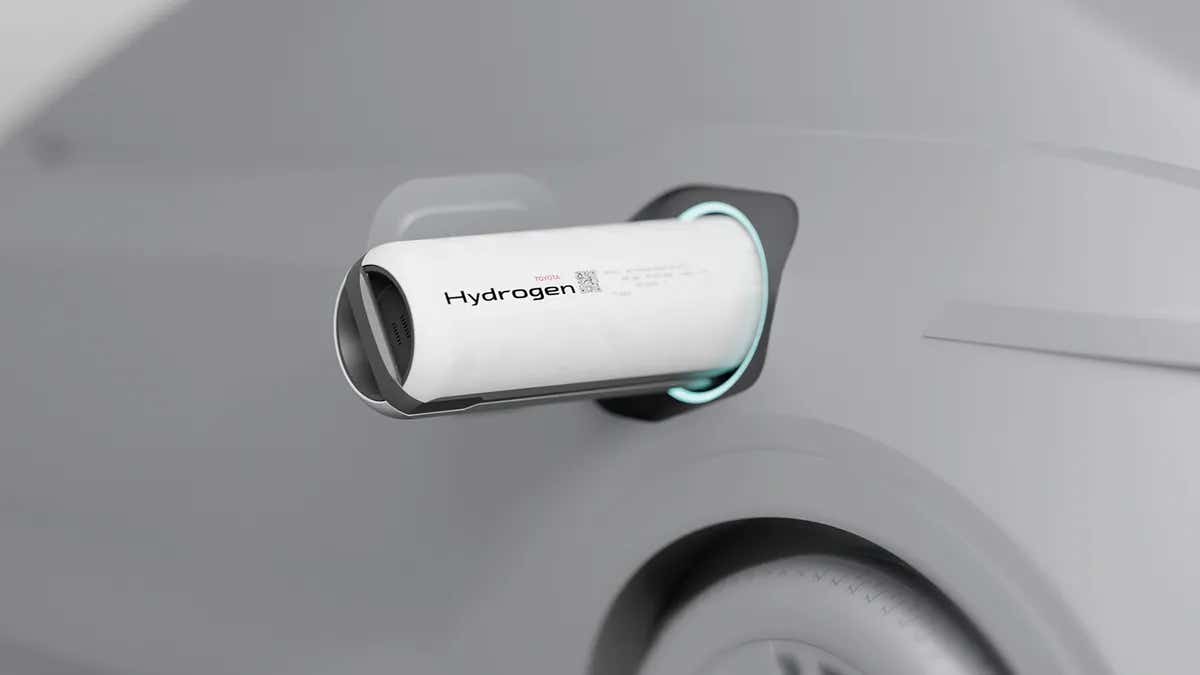Toyota eliminates EV range anxiety through swappable hydrogen fuel cell batteries
This idea centers around the ability to swap out hydrogen cartridges when needed, offering a more flexible and accessible energy solution

This idea centers around the ability to swap out hydrogen cartridges when needed, offering a more flexible and accessible energy solution not just for cars, but potentially for homes and other applications. (CREDIT: Toyota)
Toyota is set to highlight its strides in sustainable technology at the Japan Mobility Bizweek, showcasing its innovative approach to hydrogen-powered mobility. One of the key innovations to be unveiled is the company's vision for a portable hydrogen cartridge system, which could redefine how hydrogen fuel cell electric vehicles (FCEVs) operate.
This idea centers around the ability to swap out hydrogen cartridges when needed, offering a more flexible and accessible energy solution not just for cars, but potentially for homes and other applications.
Toyota first introduced a working prototype of these hydrogen cartridges in 2022, through its subsidiary Woven. Since then, the company has continued to refine and develop the concept, with the latest cartridges now being lighter and more portable.
The advancements are based on Toyota’s experience in making smaller and more efficient hydrogen tanks for its FCEVs. The end goal is to offer a portable energy solution that can be easily carried and used in a variety of situations.
The hydrogen cartridges are designed to be compact and light enough for individuals to carry by hand. In one demonstration, a person is seen carrying a cartridge in a specially designed backpack that resembles an oversized AA battery. These cartridges offer the convenience of swapping out a depleted fuel source in a hydrogen-powered vehicle without the need for a traditional refueling stop, much like how you might swap out batteries in other devices.
But the potential uses for these hydrogen cartridges go beyond just vehicles. Toyota envisions them being used to power homes, or even for cooking, as demonstrated by their collaboration with the Rinnai Corporation.
At the Japan Mobility Bizweek, Toyota and Rinnai are exhibiting a hydrogen-powered stove, showcasing how the cartridges could fuel daily appliances. In the event of an emergency, such as a power outage, these cartridges could also serve as backup power sources for devices.
Related Stories
Although the technology remains in the concept phase, Toyota believes these lightweight, portable cartridges could offer a more affordable and convenient way to deliver hydrogen to consumers, eliminating the need for extensive infrastructure, such as a vast network of hydrogen pipelines. This approach could make hydrogen a more accessible energy source, particularly in areas that might otherwise struggle with energy infrastructure challenges.
Toyota’s vision is not limited to just passenger vehicles. The company foresees a future where these hydrogen cartridges power a wide range of vehicles, from motorcycles to larger passenger cars, as well as various household and industrial appliances. This flexibility is what Toyota believes will set hydrogen apart as a fuel source.
In addition to their portability, these cartridges could be part of a system where fresh cartridges are delivered regularly, much like groceries, and spent ones are collected for refilling. Toyota is currently seeking partnerships with companies and startups to explore opportunities in both service provision and the development of devices that can use the cartridges.
The versatility of hydrogen as a fuel source is one of its greatest strengths. Hydrogen can be used either to generate electricity in fuel cells or as a combustion fuel. What makes it particularly appealing is its environmental impact: hydrogen emits no carbon dioxide when used, with water being the only byproduct.
If hydrogen is produced using renewable energy sources, like wind or solar power, it could play a critical role in helping countries meet their net-zero emissions targets.
While hydrogen has long been discussed as a potential alternative to traditional fossil fuels, it has faced stiff competition from electric vehicles (EVs) in recent years. However, with global demand for EVs slowing, there is renewed interest in hydrogen as a viable energy solution.
Companies such as Hyundai, BMW, and Honda are actively exploring ways to make hydrogen-powered vehicles more commercially viable. These companies see the potential for hydrogen to fill gaps left by the limitations of current battery technology in EVs, particularly when it comes to range and refueling times.
Toyota’s hydrogen cartridge system could be a game-changer, offering a flexible, portable, and sustainable energy solution for a wide range of applications. The ability to use hydrogen not just in cars but in homes and appliances presents a unique opportunity to rethink how we use and distribute energy.
As technology continues to evolve, it will be fascinating to see how Toyota’s vision of portable hydrogen power unfolds and how it might impact the broader energy landscape in the coming years.
Note: Materials provided above by The Brighter Side of News. Content may be edited for style and length.
Like these kind of feel good stories? Get The Brighter Side of News' newsletter.



